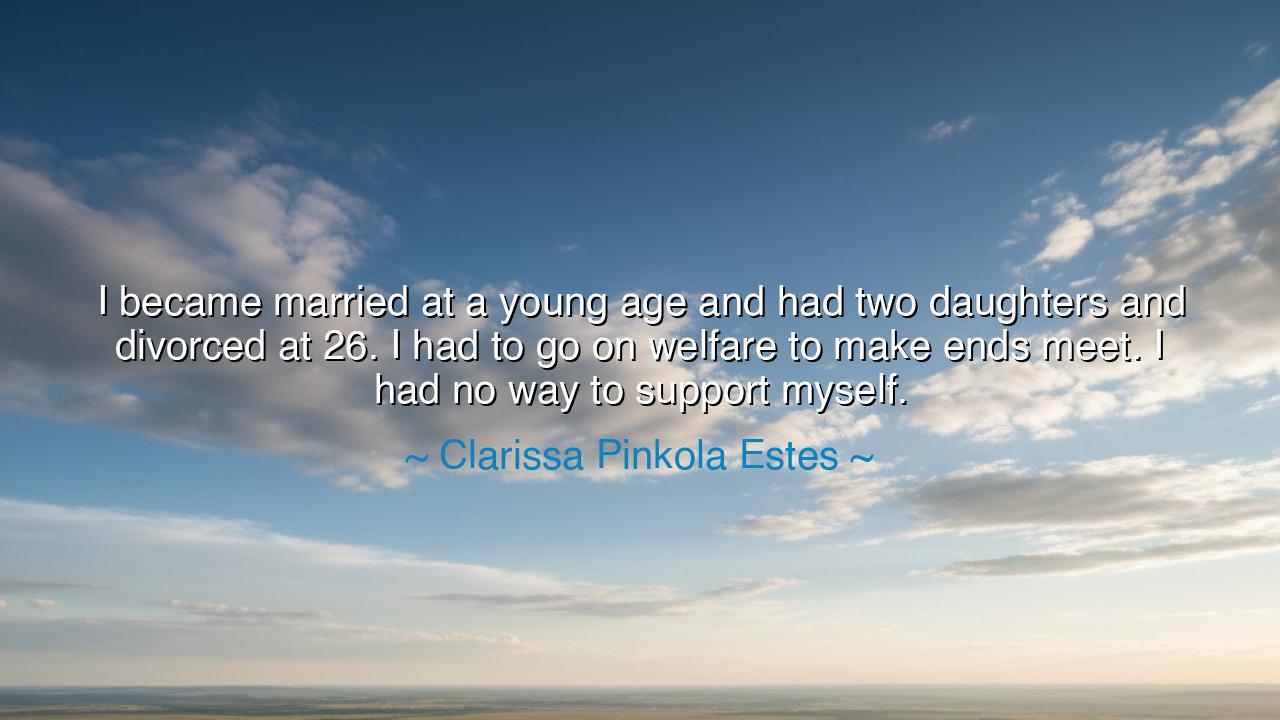
I became married at a young age and had two daughters and
I became married at a young age and had two daughters and divorced at 26. I had to go on welfare to make ends meet. I had no way to support myself.






When Clarissa Pinkola Estés, the wise storyteller and author of Women Who Run With the Wolves, said, “I became married at a young age and had two daughters and divorced at 26. I had to go on welfare to make ends meet. I had no way to support myself,” she was not merely recounting hardship — she was revealing the crucible from which her spirit was forged. These words carry the quiet weight of truth, the kind that belongs not to the proud but to the tested. In them lies the ancient story of rebirth through struggle, of the woman who loses everything only to find herself. Her voice is that of every soul who has faced ruin and chosen to rise, of every person who has discovered that poverty of circumstance does not mean poverty of soul.
In her confession is a kind of sacred vulnerability. To be young, divorced, and without means is to stand at the edge of the world, stripped of safety and certainty. Yet it is from such edges that transformation begins. Estés’ words remind us that suffering is not the end of the story; it is the threshold of awakening. The pain of helplessness, the humiliation of dependence, the fear of an unknown future — these are not curses but initiations. They burn away illusion and teach endurance. What remains after such fire is something pure, something unbreakable. The one who has faced despair and survived becomes, in time, the keeper of deep wisdom.
Clarissa Pinkola Estés would later become a psychologist, a poet, and a healer of women’s souls, but her strength was not born in comfort — it was born in hardship. Her early life, marked by struggle, poverty, and loss, became the soil from which her compassion grew. She learned not from theory but from experience, not from ease but from necessity. This is why her later work speaks so fiercely and so beautifully about the wild woman — the instinctive, untamed spirit within all who have endured pain and refused to be broken by it. Her story is not just her own; it is the story of all those who have been silenced, discarded, or underestimated, and who found in their suffering a secret power.
There are echoes of this truth throughout history. Consider the life of Harriet Tubman, who was born enslaved and illiterate, yet became a conductor of freedom itself, leading hundreds to liberation. She, too, had “no way to support herself” by the standards of her time, yet her courage became a weapon stronger than any wealth. Or think of Mary Wollstonecraft, abandoned, impoverished, and mocked, yet who wrote A Vindication of the Rights of Woman — a text that shook the foundations of her age. Like Estés, they discovered that necessity breeds strength, and that those who have nothing left to lose are often those who gain everything that matters: clarity, courage, and truth.
Estés’ words also carry a warning for the world. Too often, society measures worth by what one possesses — by money, status, or stability — and forgets that true worth is measured by resilience. To stand in the ashes of your life and still choose to nurture others, to create beauty from ruin, is to participate in the oldest of human miracles. For what the world calls failure, the soul calls initiation. The one who endures poverty and heartbreak learns to hear the language of survival — the same ancient rhythm that beats through the heart of nature itself.
Yet, her message is not one of bitterness but of rebirth. The woman who once “had no way to support herself” became one who supports countless others through her words, her wisdom, her storytelling. She became a guardian of the inner life, teaching that wounds are not signs of weakness, but of transformation. The wolf she so often writes of — wild, fierce, maternal — is her own spirit, resurrected from despair. Her life proves that hardship, when faced with dignity, becomes a source of light. It teaches us to honor the broken places, for it is through them that grace enters.
So, O seeker of strength, remember this: your struggle is not your shame — it is your making. When life strips you bare, do not curse the storm; become the fire that endures it. Learn, as Estés did, to see beauty in resilience, to find meaning in pain, and to use your story as a lantern for others still walking in the dark. Do not be afraid to begin again, even from nothing, for the soul’s greatest victories are born from apparent defeat.
Thus, the teaching endures: to lose everything is not the end, but the beginning of wisdom. Clarissa Pinkola Estés’ journey reminds us that every fall can be sacred, every wound can be a teacher, and every broken life can be rebuilt stronger than before. To live through hardship with courage is to become part of an ancient lineage of survivors — those who rise not in spite of struggle, but because of it.






AAdministratorAdministrator
Welcome, honored guests. Please leave a comment, we will respond soon